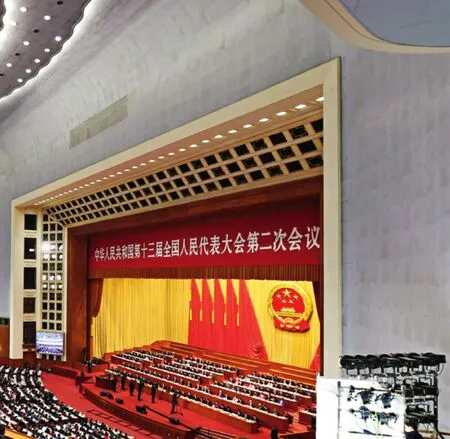HOW WILL THE FOREIGN INVESTMENT LAW PROMPT HIGH-LEVEL OPENING-UP?
Each spring,the topics thataremost heatedly discussed at the Two Sessions,or the National People's Congress(NPC)and the Chinese People's Political Consultative Conference (CPPCC),alwaysdraw worldw ide attention.Thisyear,the passage of Foreign Investment Law made headlines nationwideand even among internationalmedia outlets.
Inhis reporton theworkof the governmentat the opening meeting of the second sessionof the13thNPConMarch5,Chinese Premier Li Keqiang stressed that effortsshould bemade to “advance reform and opening-up and createa business environmentbased on the ruleof law thatis internationalized and enabling.”OnMarch 8,Wang Chen,vice chairmanof theNPC Standing Committee,explained the draftof Foreign Investment Law to NPC deputies.On March 15,China's national legislature passed the law.
China's foreign investmentwork hasbeen proceeding steadily w ith the rule of law from the very start.Legislations related to foreign investmentwere someof the first laws adopted after the country began its reform and opening-up in 1978.Standardizing the threemain formsof foreign-invested enterprises,the Law on Chinese-Foreign Equity Joint Ventureswas passed on July 1,1979,followed by the Law on Foreign-Capital Enterprises adopted in 1986 and then the Law on Chinese-Foreign ContracturalJoint Ventures promulgated in 1988.These three laws formed the legal basis for foreign investmentin China and have played a vitalrole in ensuring rationaland healthy utilization of foreign funding.
Around the time of itsentry into theWorld Trade Organization (WTO),China extensively reviewed and amended its lawsand regulations related to foreign trade to fu lfillits comm itment to joining the organization.In 2000 and 2001,legislative and administrative authorities revised the above-mentioned “three foreign investment laws”and their enforcement regulations,based onwhich in 2011China established a security review mechanism for foreign investors acquiring domestic enterprisesafter draw ing on experience from international practice.
Amendmentof the three laws further optimized the business environment for foreign investors,and the deepening and upgrading of opening-up propelled China's transition from a planned economy to a market economy.

The third p lenary m eeting of the second session of the 13th National Peop le's Congressheld at the Great Hallo f the Peop le in Beijing on March 12.
As China's first un ified law on foreign investment,how willthe Foreign Investment Law better protect the legitimate rightsand interestsof foreign investorsand provide legal foundation for thenew round ofhighlevel opening-up?The intense spotlighton the Law evidences high expectations from the international community for China's comprehensive deepening of reform and opening-up.

